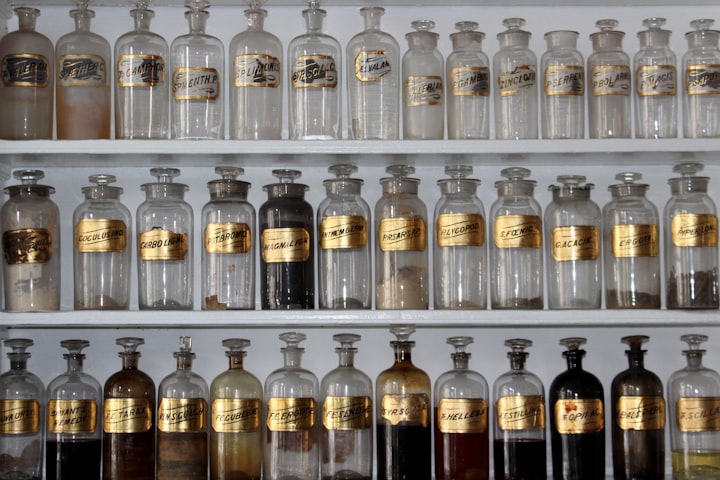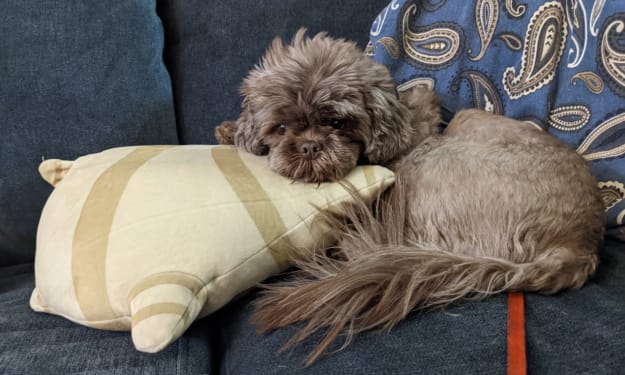The Allure of a Label
Musings of a Pigeon-Holer

When I was first seeking a true diagnosis, back in December of 2020, I found myself clinging to a list of possible mental illnesses that could be the source of my symptom. Much like when I realized I was not straight, I felt like I needed a label to understand and justify myself. I landed on bisexual, was desperate for a generalized anxiety disorder diagnosis, and leaned heavily on my desire to be an academic. Fast forward to a month or two ago and you’d have found me drafting this piece for the first and most certainly not last time. Then, I wanted to write about person-first and identity-first language. I wanted to air more grievances about not having identity-first language for my borderline personality disorder or my schizoaffective disorder. I’m more than an anxious person or a queer person, but I don’t have words that describe the other identities. I’ve been searching for descriptors, all the while ignoring the terms disabled and chronically ill. Enter my newest therapist, who needed only one session to pin me squarely in the label-lover category.
I have this hypothesis about labels and marginalized people. Because our identities separate and ostracize us from the rest of society, we cling to them. We simplify ourselves down to the most objectionable thing about us, as defined by cis-gender, able-bodied, white people, mostly men. I’m sure that it’s not a brand new concept and could likely be found in the texts of sociological or gender studies papers. For me, that means that I am simply bi and gray-sexual, non-binary, depressed, anxious, and mentally ill. I lean into those things, especially my BPD diagnosis, as cornerstones of my personality and essence. These identities help me put myself into a little box of behavior, as well as giving me an excuse for feelings, actions, or reactions.
For me, it doesn’t stop there. I love a good label, serious or otherwise. I’m an Enneagram six wing five, an INFJ-Turbulent, a Blue on the True Colors test, and a raging Taurus Sun, with a Sagittarius Moon and a Gemini Rising. I really only grasp the Enneagram identity well and rely heavily on my partner and her best friend to elucidate the intricacies of astrology to me. None of that stops me from using all of this as a part of my self-deprecating humor. Dr. F marked that from the get-go, immediately expressing concerns about my attachment to identities. So I’m having to re-evaluate how I’ve defined myself.
While I don’t choose my friends based on identities, I do often base behaviors on what I feel is expected of someone with my identities or illnesses. This is especially dangerous with my BPD, because one of my primary symptoms is that feeling of emptiness and the lack of sense of self. It has led to the construction of a well-loved mask, one that I am quite fond of hiding behind. Every once and a while, I make an attempt to become me, with journal prompts or silly question books. This is hard work though, because in many ways, being genuine is simply another performance. I don’t know how to be genuine most of the time, because I don’t have a sense of identity upon which to base my genuine behavior.
Despite all my emptiness and the toxicity of my love of labels, I found recently a label that was freeing. According to the ADA, I am disabled. At least two of my diagnoses are lifelong battles. In the last few months, learning to consider myself disabled and chronically ill has lifted a weight of expectation that I can do everything and not be a danger to myself. I struggle with self-harm and suicidality, which are greatly exasperating the more I wear myself down. I struggle with care-tasks, on a schizophrenic and worthiness level, along with your run of the mill executive dysfunction. By admitting to myself that I am disabled, that the world is not made for brains like mine, it allows me to let go of things that exacerbate my symptoms.
This was quite a long-winded confession, but it was important for me to write. I’ve learned in therapy and in trying to write this that the only identity-first language that is helpful and validating for me is disabled. The rest are simply frightened rabbits that I’ll never catch and that are, quite frankly, not worth catching. Will I still use my labels as a framework for my personality? Almost certainly, but it helps to know and admit to others that those labels are not me. It is a form of accountability, to promise to learn who I am and what I think, rather than what I feel that I am supposed to think and how I feel I am supposed to act.
About the Creator
K.E. Diller
I won't promise you organization or consistent genres, I'm too much of a mess for that. As a writer, I seek to convey my experiences as a queer and mentally ill person while indulging my love of fantasy. Take what you like, leave the rest.






Comments
There are no comments for this story
Be the first to respond and start the conversation.